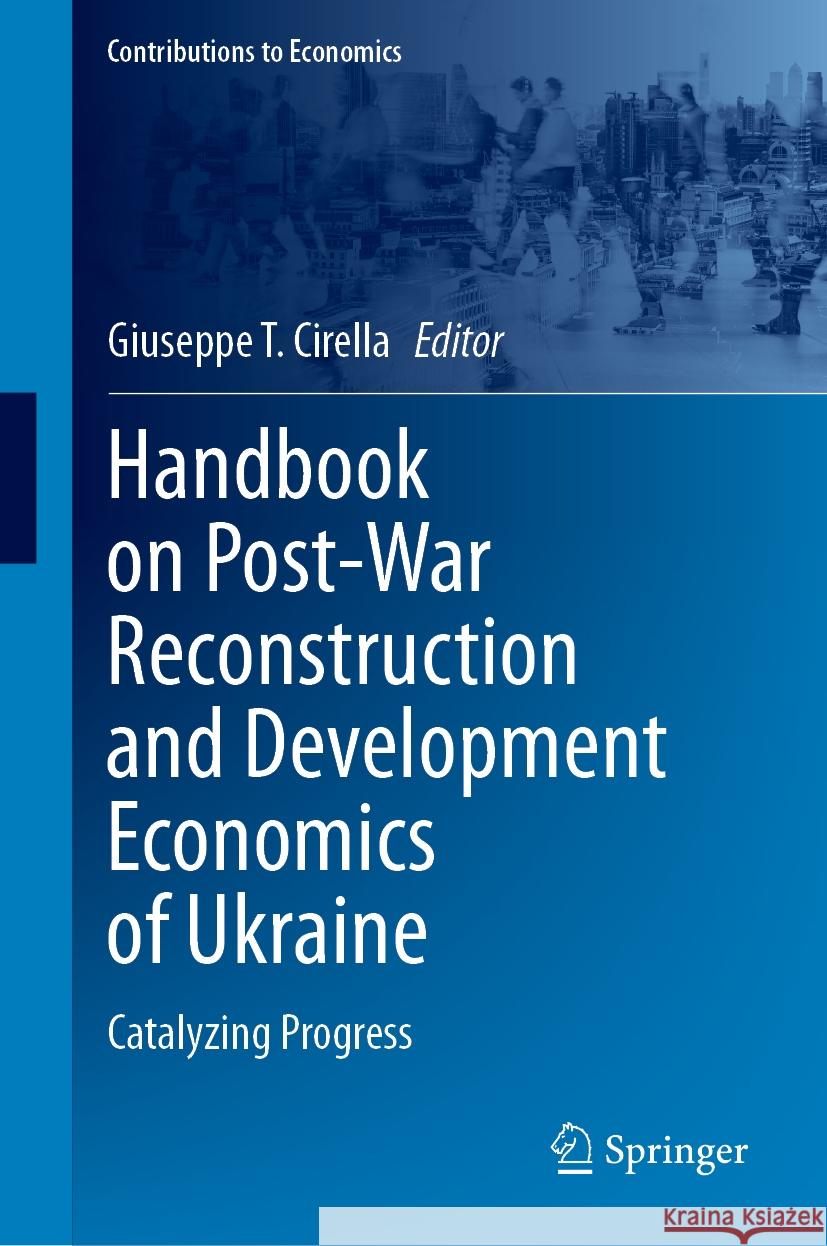Handbook on Post-War Reconstruction and Development Economics of Ukraine: Catalyzing Progress » książka



Handbook on Post-War Reconstruction and Development Economics of Ukraine: Catalyzing Progress
ISBN-13: 9783031487347 / Angielski
Handbook on Post-War Reconstruction and Development Economics of Ukraine: Catalyzing Progress
ISBN-13: 9783031487347 / Angielski
(netto: 881,78 VAT: 5%)
Najniższa cena z 30 dni: 886,75
ok. 22 dni roboczych.
Darmowa dostawa!
Part 1: Strengthening National Security Through Technology and Governance.- Chapter 01. Public Governance of the National Security of Ukraine.- Chapter 02. Utilizing Information and Communication Technology Systems for the Formation of National Security.- Chapter 03. Conceptual Framework of Ukraine’s National Security: Regulatory Examination Using Information and Communication Technologies.- Chapter 04. An Integrated Methodological Framework for Advancing Information and Communication Technology in Environmental Protection Within the Context of Ukraine’s National Security.- Part 2: Strategies for Sustainable Economic Development.- Chapter 05. Standardizing Business Management by Greening Domestic Production.- Chapter 06. Modeling a System of Adaptive Management of Manufacturing Enterprises in Ukraine: Political, Economic, Socio-cultural, and Technological Analysis.- Chapter 07. Advancing State Regulation of Information and Communication: a Framework for Managing the Complex Socioeconomic System in Ukraine.- Chapter 08. Insurance Companies and Territorial Positioning in Ukraine’s Post-war Economic Development: a Comprehensive Historical Analysis, 2015-1019.- Chapter 09. Challenges and Perspectives in Assessing Technological Development: a Focus on Ukraine's Processing Industry.- Chapter 10. Enhancing Competitiveness Management in Ukraine’s Post-war Industrial Enterprises: Theoretical Insights and Strategic Implications.- Chapter 11. Examining the Link Between Corporate Sustainability and Financial Performance: an Empirical Study With Implications for Post-conflict Ukraine.- Chapter 12. Ukraine’s Potential for Sustainable Development: Exploring Global Implications Amidst Conflict and Reconstruction.- Part 3: Advancing Tourism Development and the Hospitality Sector.- Chapter 13. Modern Trends and Spatial Planning of Hotel Complexes: Navigating Uniqueness, Challenges, and Post-war Development in Ukraine’s Tourism Landscape.- Chapter 14. Tourism Development and Resilience in Ukraine: Challenges and Enhancing Competitiveness.- Chapter 15. Sustainable Tourism Development and Strategies in Ukraine: Balancing Environmental, Social, and Economic Dimensions.- Chapter 16. Sustainable Ecotourism Development: Integrating Public Marketing, Community Engagement, and Environmental Stewardship in Ukraine.- Part 4: Marketing and Communication for Territory Development.- Chapter 17. Adaptive Marketing Strategies for Post-conflict Reconstruction, Regional Development, and Sustainable Growth in Ukraine.- Chapter 18. Marketing Strategies and Communication Dynamics for Territorial Development in Post-conflict Ukraine.- Chapter 19. Intersecting Territorial Development, Spatial Planning, and Marketing: a Multidisciplinary Exploration of Post-conflict Ukraine.- Chapter 20. Strategic Communication and Public Marketing for Territory Positioning in Ukraine: Media Engagement, Resource Utilization, and Image Formation.- Part 5: Urban Transformation and Infrastructure Advancements.- Chapter 21. Enhancing Urban Solid Waste Management Through an Integrated Geographic Information System and Multicriteria Decision Analysis: a Case Study in Post-war Reconstruction.- Chapter 22. Statistical Modeling for Forecasting Pipeline Reliability: Post-war Reconstruction Strategies for Heating Networks in Ukraine.- Chapter 23. Urban Evolution: Analyzing Architectural and Functional Transformations in Railway Station Complexes for Post-war Reconstruction in Ukraine.- Chapter 24. Innovation in Ukraine’s Construction and Post-war Recovery: the Transformative Power of Information Technology.- Chapter 25. Architectural Software Trends: Bridging Education and Practice to Build Ukraine’s Future.- Chapter 26. Optimizing Urban and Social Planning Structures in Medium-sized Cities: Lessons From Uzhhorod for Post-war Reconstruction in Ukraine.- Chapter 27. Towards Standardization and Modernization: Advancing a Cadastral System in Ukraine.- Chapter 28. Building Sustainable and Resilient Cities in Ukraine: Functional Zoning and Form-based Codes in Urban Development.
Giuseppe T. Cirella, Professor of Human Geography, works at the Faculty of Economics, University of Gdansk, Sopot, Poland, where he recently received his equivalency Doctor of Habilitation (Dr. Hab.) in Economics and Finance. He specializes in economic development, environmental social science, and sustainability. His interdisciplinary background also includes socio-political research throughout Eastern Europe, Africa, and China. After completing a Doctor of Philosophy (Ph. D.) at Griffith University, Gold Coast, Australia, within the Centre for Infrastructure Engineering and Management, developing a sustainability-based index, he founded the Polo Center of Sustainability in Italy. Notably, he has held professorships and scientific positions at Saint Petersburg State University, Saint Petersburg, Russia; Inner Mongolia University of Science and Technology, Baotou, China; Life University, Sihanoukville, Cambodia; and Free University of Bozen, Bozen, Italy. In his early career, he worked with the Canadian International Development Agency in Indonesia as well as with Radarsat International in Brazil. He is also on the editorial board of a number of internationally renowned academic peer-reviewed journals.
This authoritative handbook offers insights into the complexities of post-war reconstruction and development economics in Ukraine. Covering a broad spectrum of topics, from bolstering national security to fostering sustainable economic growth, it offers a comprehensive understanding of the economic dynamics, factors, and practical applications shaping policy and programs.
1997-2026 DolnySlask.com Agencja Internetowa
KrainaKsiazek.PL - Księgarnia Internetowa









